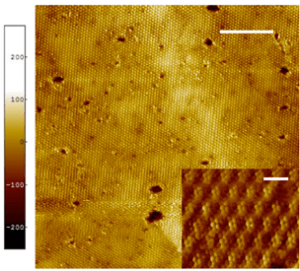Summary
This project advances our ability to characterize and study novel quantum materials, quantum devices, and even individual molecules at the atomic level. By combining Non-Contact Atomic Force Microscopy (NC-AFM), Scanning Tunneling Microscopy (STM) and scanning gate methods, we correlate spatial information with transport properties and can locally manipulate charge, spin and structural states. This opens a unique and useful window on the physics of 2D materials, 1D systems such as carbon nanotubes and 0D objects like quantum dots and molecules. We will collaborate with Adam Wei Tsen’s group to study surface electronic transport properties of 2D materials and correlate these with their bulk transport characteristics. We will also apply STM and Scanning Tunneling Spectroscopy (STS) to achieve atomic-scale resolution imaging of single molecules in collaboration with David Cory’s group. We expect this project will create a unique capability to probe and manipulate matter at the atomic scale, leading to accelerated development of novel transistors and spintronic devices, quantum sensors, ultra-high density classical and quantum information storage, and novel qubit applications.

Figure 1. Topographic image of exfoliated 1T-TaS2 at 77 K (scale bar = 20 nm) obtained in the scanning tunneling microscope. The colour scale is in picometers. The periodic structure resolved in the main image is a charge density wave known to occur in this material. Inset: magnified image showing both the charge density wave and the underlying atomic lattice (scale bar = 1.4 nm).
Related Content

Quantum Simulation of Strongly Coupled Field Theories
Strongly-coupled field theories describe both fundamental and applied quantum problems.
August 10, 2017

Qubits and Quantum Effects in Biology
It is unknown whether biological processes make direct use of quantum effects, as opposed to depending merely on the influence of quantum physics on chemical bonding and molecular structure.
June 1, 2017

Developing Tools for Quantum Characterization and Validation
Summary Coherence is essential for quantum computation; yet it introduces a unique sensitivity to any imperfections in hardware design, control systems, and the operating environment. Overcoming these sensitivities requires a hierarchy of strategies, ranging from optimization of the hardware architecture to software solutions including quantum error correction. Randomized Benchmarking Protocols are an important family of […]
October 3, 2017


